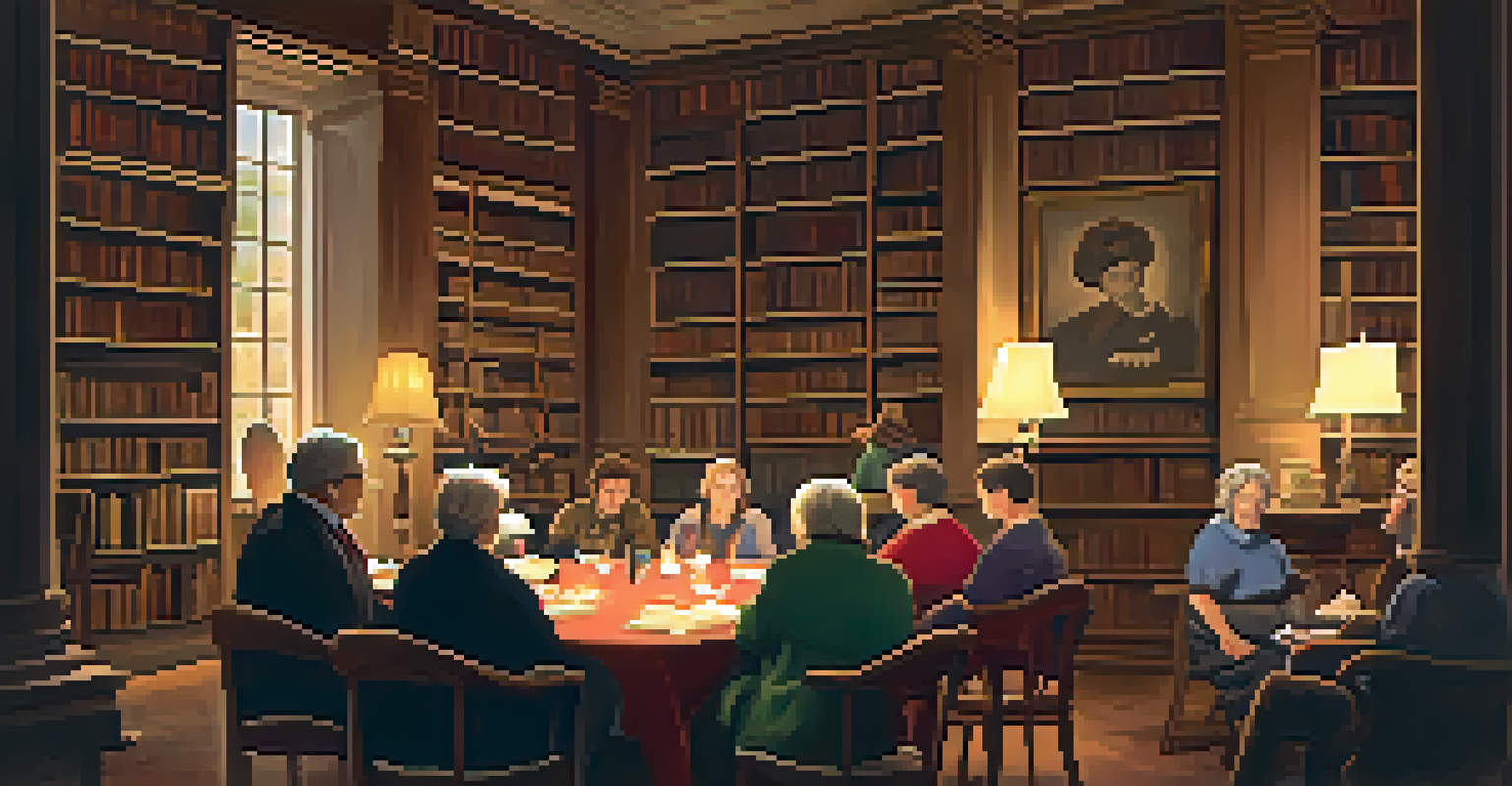The Impact of Local Historical Societies on Community Identity

Understanding Local Historical Societies and Their Role
Local historical societies are organizations dedicated to preserving and promoting the history of a specific area. They often collect artifacts, documents, and stories that highlight the unique heritage of the community. By showcasing local history, these societies play a vital role in fostering a sense of belonging among residents.
History is not a burden on the memory but an illumination of the soul.
These societies often host events, workshops, and exhibitions that engage the community and encourage participation. This not only helps to educate the public about their shared history but also creates a platform for storytelling that resonates with individuals. When people see their experiences reflected in local history, it strengthens their connection to the community.
Furthermore, local historical societies can provide a space for collaboration among residents, historians, and educators. This partnership promotes a deeper understanding of history's relevance today and empowers individuals to become active participants in preserving their cultural legacy.
Building Community Pride Through Historical Awareness
One of the most significant impacts of local historical societies is the cultivation of community pride. When residents learn about their town's rich history, they often develop a sense of ownership and responsibility towards preserving it. This pride can manifest in various ways, from maintaining historical sites to participating in community events.

For example, a local historical society might organize a heritage festival that celebrates the town's founding. Such events not only educate attendees about their history but also foster a deeper appreciation for their community. As people share their stories and celebrate their heritage, a shared identity begins to form.
Local History Builds Community Pride
Engaging with local history fosters a sense of ownership and responsibility among residents, leading to increased community involvement.
Moreover, this pride can lead to increased community involvement in local governance and initiatives. When residents feel connected to their history, they are more likely to advocate for preservation efforts and engage in discussions about the future of their community.
Preserving Local Heritage for Future Generations
Local historical societies play a crucial role in preserving the tangible and intangible heritage of a community. By archiving documents, photographs, and artifacts, they create a repository of local history that can be accessed by future generations. This preservation ensures that the stories and experiences of the past are not lost over time.
To know where you are going, you must first know where you have been.
In addition to physical artifacts, these societies often document oral histories from long-time residents. These narratives provide personal insights into the community's evolution, offering a richer, more nuanced understanding of its identity. As a result, future generations can appreciate their roots and the journey that shaped their community.
By engaging in educational programs and outreach, local historical societies also inspire younger generations to take an interest in their heritage. This connection to the past is essential for nurturing a sense of identity that can guide communities into the future.
Enhancing Local Tourism Through Historical Engagement
Local historical societies can significantly boost tourism by highlighting the unique aspects of a community's history. By creating guided tours, historical markers, and informative brochures, these organizations make local history accessible to visitors. This not only attracts tourists but also encourages them to explore and appreciate the area.
For instance, a city with a rich industrial history might offer tours of preserved factories and museums that showcase artifacts from that era. Visitors who engage with these stories often leave with a deeper understanding of the community's significance, which can translate into positive word-of-mouth promotion.
Historical Societies Boost Tourism
By showcasing unique local heritage, historical societies attract tourists, benefiting the local economy and enriching community identity.
Moreover, increased tourism can lead to economic benefits for the community, as visitors explore local shops, restaurants, and attractions. As historical societies promote their heritage, they contribute to a vibrant local economy while simultaneously enriching the community's identity.
Fostering Intergenerational Connections Through History
Local historical societies often serve as a bridge between generations, fostering connections through shared stories and experiences. By organizing events that encourage participation from both young and old, these organizations create opportunities for dialogue and learning. This interaction helps younger generations understand the struggles and triumphs of their predecessors.
For example, storytelling events where elders share their life experiences can be invaluable for young community members. These narratives provide context for historical events, making them more relatable and impactful. As younger residents engage with their history, they develop a sense of respect and appreciation for the wisdom of their elders.
This intergenerational connection can also inspire collaborative projects, such as community art installations or historical reenactments, which further strengthen community bonds. By valuing the contributions of all generations, local historical societies enrich the fabric of community identity.
Encouraging Civic Engagement and Community Involvement
Local historical societies can inspire civic engagement by encouraging residents to take an active role in preserving their community's history. When individuals feel connected to their heritage, they are more likely to participate in local decision-making processes and advocate for community improvements. This increased engagement can lead to a more vibrant and responsive local government.
For instance, a historical society might host town hall meetings to discuss preservation efforts, inviting residents to share their thoughts and ideas. This collaborative approach fosters a sense of ownership and responsibility among community members, making them feel invested in their local history and future.
Digital Tools Enhance Historical Access
In the digital age, local historical societies utilize online platforms to expand their reach and make local history accessible to a broader audience.
As residents become more engaged in historical preservation, they often extend their involvement into other civic activities, such as volunteering for local nonprofits or participating in community clean-up efforts. This ripple effect strengthens community bonds and cultivates a culture of collaboration and support.
The Digital Age: Expanding the Reach of Local History
In today's digital age, local historical societies are finding new ways to share their stories and engage the community. Online platforms and social media allow these organizations to reach a broader audience, making local history accessible to anyone with an internet connection. This digital presence can enhance community identity by showcasing the unique aspects of local heritage.
For example, a historical society might create a virtual museum or host online lectures to share their findings with a global audience. This not only preserves the community's history but also encourages dialogue and collaboration with other historical organizations. As more people learn about a community's past, the sense of identity can expand beyond geographical boundaries.

Moreover, digital tools can help local historical societies document and preserve their collections more effectively. By utilizing technology, these organizations can create archives that are both engaging and informative, ensuring that local history remains relevant and accessible for future generations.